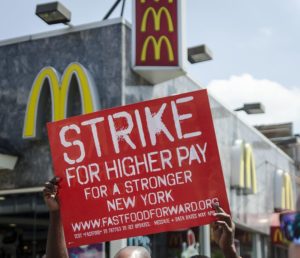 Are smart machines coming for our jobs?
Are smart machines coming for our jobs?
In the past, technological change has generally led to the displacement of workers from some jobs, but also to the creation of new work. For example, as automation reduced the number of workers needed to grow and harvest crops in the early 20th century, technological change resulted in employment gains in the manufacturing and service sectors.
Today, however, many worry that the historical link between technological innovation and job creation may be coming to an end.
Big data and artificial intelligence make it possible for computers to perform tasks that previously required complex human cognition. Software algorithms are already driving cars, diagnosing diseases, and writing news articles.
A credible case can be made that, thanks to the rapid development of AI, this wave of technological change will usher in an era of widespread unemployment.
Most contemporary inquiries into the future of work offer projections of employment trends at the level of industries or occupations. These studies are useful for helping us conceptualize broad shifts in labor markets, but they aren’t able to shed light on the complex and unpredictable ways in which human workers and software systems interact in real-world settings.
In a recent study, I argue that in-depth examinations of the organizations in which software algorithms are developed and implemented can help us generate new insights into the question of when software systems function autonomously, and when they rely on the assistance of complementary human workers.


 Every fall, a new crop of students enrolls in colleges across the country. Some pack up their belongings, leaving home and moving into dorms on campuses, while others start daily commutes.
Every fall, a new crop of students enrolls in colleges across the country. Some pack up their belongings, leaving home and moving into dorms on campuses, while others start daily commutes. The association between income and wealth is surprisingly complex and not well-understood. Yet this relationship is central to many of the questions that scholars of work, occupations, and inequality study.
The association between income and wealth is surprisingly complex and not well-understood. Yet this relationship is central to many of the questions that scholars of work, occupations, and inequality study. The political homeownership ideal is the promise to create more equal and stable societies as well as to solve housing market problems by making more people homeowners, largely through the extension of mortgage credit to homebuyers. It also promises to fill the gap left by declining public housing and infrastructure investments and retrenching welfare states.
The political homeownership ideal is the promise to create more equal and stable societies as well as to solve housing market problems by making more people homeowners, largely through the extension of mortgage credit to homebuyers. It also promises to fill the gap left by declining public housing and infrastructure investments and retrenching welfare states. Compared with the increasing number of women entering male-dominated occupations, the number of men in female-dominated occupations remains very low. The male presence in typically female occupations has hovered at the levels observed in 1980, rising only slightly from 8 percent to 9.5 percent over the ensuing two decades.
Compared with the increasing number of women entering male-dominated occupations, the number of men in female-dominated occupations remains very low. The male presence in typically female occupations has hovered at the levels observed in 1980, rising only slightly from 8 percent to 9.5 percent over the ensuing two decades.
 Many people enter occupations that require about the same level of education as they have, but some people enter occupations where their level of education exceeds the required level. Are these overeducated workers less happy with their work than other workers? We sought to answer this question in
Many people enter occupations that require about the same level of education as they have, but some people enter occupations where their level of education exceeds the required level. Are these overeducated workers less happy with their work than other workers? We sought to answer this question in 
